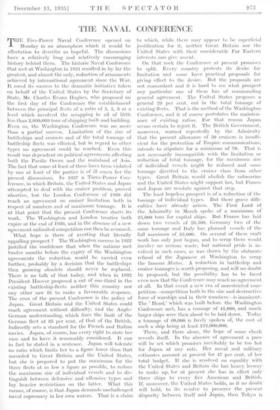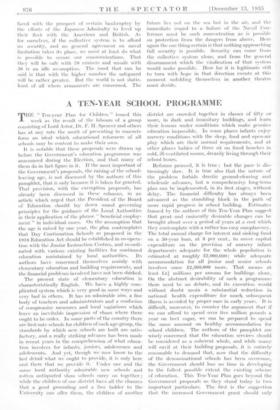THE NAVAL CONFERENCE
THE Five-Power Naval Conference opened on Monday in an atmosphere which it would be affectation to describe as hopeful. The discussions have a relatively long and relatively encouraging history behind them. The historic Naval Conference that met at Washington in 1921 resulted in by far the greatest, and almost the only, reduction of armaments achieved by international agreement since the War. It owed its success to the dramatic initiative' taken on behalf of the United States by the Secretary of State, Mr. Charles Evans Hughes, who proposed on the first day of the Conference the establishment between the principal fleets of a ratio of 5, 5, 3 at a level which involved the scrapping in all of little less than 2,000,000 tons of shipping built and building. tven so, the Washington Conference was no more than a partial success. Limitation of the size of battleships and cruisers and of the total tonnage of battleship fleets was effected, but in regard to other types no agreement could be reached. Even this result was dependent on political agreements affecting both the Pacific Ocean and the mainland of Asia. The fact that some at least of these have been violated by one at least of the parties is of ill omen for the present discussions. In 1927 a Three-Power Con- ference, in which Britain, the United States and Japan attempted to deal with the cruiser problem, proved abortive, but the 'London Conference of 1930 did reach an agreement on cruiser 'limitation both in respect of numbers and of maximum tonnage. It is at that point that the present Conference starts its work. The Washington and London treaties both expire at the end of 1936, and in the absence of a new agreement unlimited competition can then be resumed.
' What hope is there of averting that literally appalling prospect ? The Washington success in 1922 justified the 'confidence that when the nations met twelve months before the expiry of the Washington agreements the reduction would be carried even further, probably by a decision that the battleships then growing obsolete should never be replaced. There is no talk of that today, and when in 1932 President Hoover proposed a cut of one-third in the existing battleship-fleets neither this country nor any other saw fit to make a favourable response. The crux of the present Conference is the policy of Japan. Great Britain and the United States could reach agreement without difficulty, and the Anglo- German understanding, which fixes the limit of the German fleet at 35 per cent. of that of the British, indirectly sets a standard for the French and Italian navies. Japan, of course, has every right to state her case aid to have it reasonably considered. It can in fact be stated in a sentence. Japan will tolerate no ratio which limits her to a figure lower than that accorded to Great Britain and the United States, but she is prepared to put the maximum for the three fleets at as low a figure as possible, to reduce the maximum size of individual vessels and to dis- tinguish between defensive and offensive types and lay heavier restrictions on the . latter. What this means, of course, is that Japan demands unchallenged naval supremacy in her own waters. That is a claim
to which, while there may appear to be superficial' justification for it, neither Great Britain nor the United States with their considerable Far Eastern interests can give assent.
On that rock the Conference at present promises to split. Every country protests its desire for limitation and some have practical proposals for giving effect to the desire. But the proposals arc not concordant and it is hard to see what prospect any particular one of them has of commanding general agreement. The United States proposes a general 20 per cent. cut in the total tonnage of existing fleets. That is the method of the Washington Conference, and it of course postulates the inainteti- ance of existing ratios. For that reason Japan seems certain to reject, it. The British Government,. Moreover, warned repeatedly by the Admiralty that the present allowance of 50 cruisers is insuffi- cient for the protection of Empire communications, intends to stipulate for a minimum of 70. That is not necessarily incompatible with the limitation or reduction of total tonnage, for the maximum size of individual vessels might be reduced and some tonnage diverted to the cruiser class from other types. Great Britain would abolish the submarine and the United States might support her, but France and Japan are resolute against that step.
The least hopeless prospect is of a reduction of the tonnage of individual types. But there grave diffi- culties have already arisen. The First Lord of the Admiralty in March spoke of a' maximum of 25,000 tons for capital ships. But France has laid down two vessels of 26,500; Germany two of the same tonnage and Italy has planned vessels of the full maximun of 35,000. On several of these craft' Work has only just' begun, and to scrap them would involve no serious waste, but national pride is in- volved in such cases, as was shown by the obdurate refusal of the JapaneSe at Washington to scrap the famous Mutsu. A reduction in battleship and cruiser tonnages is worth proPosing, and will no doubt be proposed, but the possibility has to be faced even now that the Conference may reach no agreement at all. In that event a new era of unrestricted com- petition—competition both in the size and destructive force of warships and in their numbers'-'—is imminent. The ' Hood,' which Was built before the WashingtOn Conference met, has a tonnage of 42,000, and much larger ships were then 'about to be laid down. Today a tonnage of 60;000 is freely spoken of, the cost of such a ship being at least £12,000,000.
There, and there alone, the hope of some check reveals itself. In the absence of agreement a pace will be set which promises inevitably to be too hot for Japan at any rate. Her naval and military estimates account' at present for 47 per cent. of her total budget. If she is resolved on equality with the United :States and Britain she has heavy leeway to make up, for at present she has in effect only three ships to every five American and British. If, moreover, the United States holds, as it no doubt will hold, to its resolVe to preserve the present disparity . between itself and Japan, then Tokyo is faced with the prospect of certain bankruptcy by the efforts of the Japanese Admiralty to level up their fleet with the American and British. As for ourselves, if the collective system is to afford no security, and no general agreement on naval limitation takes its place, we must at least do what is possible to secure our communications. That they will be safe with 70 cruisers and unsafe with 50 is an idle assumption. The most that can be said is that with the higher number the safeguard will be rather greater. But the world is not static, least of all where armaments are concerned. The future lies not on the sea but in the air, and the immediate sequel to a failure of the Naval Con- ference must be such concentration as is possible on protection from the dangers from above. Here again the one thing certain is that nothing approaching full security is possible. • Security can come front the collective system alone, and from the general disarmament which the vindication of that system would make • possible. How far it is legitimate still to turn with hope in that direction events at this moment unfolding themselves in another theatre must decide.















































 Previous page
Previous page